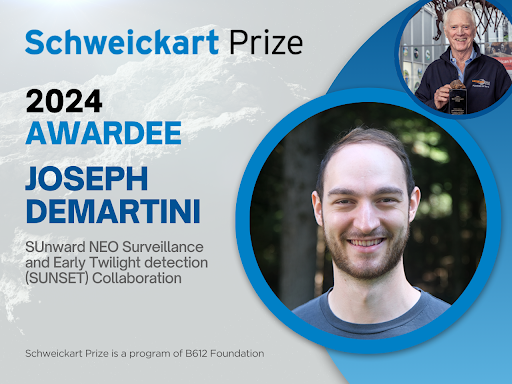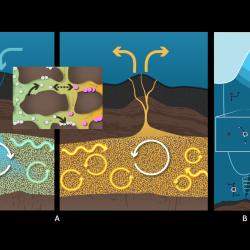UMD Astronomy Ph.D. Student Joseph DeMartini Awarded Inaugural Schweickart Prize From the B612 Foundation
The B612 Foundation awarded the first Schweickart Prize to Joseph DeMartini, an astronomy Ph.D. student at the University of Maryland, for his outstanding twilight observing campaign proposal. The prestigious prize will be presented by Apollo 9 astronaut Rusty Schweickart on June 29, 2024, at a special ceremony featuring comments from NASA astronauts Steve Smith and Nicole Stott and YouTuber Scott Manley.

"I am deeply honored to receive the Schweickart Prize," DeMartini said. "This recognition underscores the importance of global cooperation to advance our techniques for asteroid detection and planetary defense. I am grateful for the support and look forward to continuing this vital work."
DeMartini, who is advised by Astronomy Professor Derek Richardson, was selected for his innovative approach to enhance the discovery of near-Earth objects (NEOs) that have the potential to impact our planet. His SUnward NEO Surveillance and Early Twilight detection (SUNSET) Collaboration proposal promises to make important contributions to the field of planetary defense by improving the detection and confirmation of NEOs (aka asteroids) during twilight hours.
"We are honored to present the inaugural Schweickart Prize to Joe DeMartini," said Schweickart, co-founder of B612 Foundation and Apollo 9 astronaut. "Joe's proposal exemplifies the forward-thinking and scientific rigor this award seeks to recognize. His work will play a crucial role in advancing our knowledge and preparedness in the realm of planetary defense."
The Schweickart Prize is awarded by the B612 Foundation, which has developed tools and technologies to understand, map and navigate our solar system and protect our planet from asteroid impacts. The prize, named in honor of Rusty Schweickart, recognizes graduate students for their innovative ideas and potential leadership in advancing planetary defense-related fields. The prize includes a $10,000 grant in recognition of their idea or concept to support the recipient's research and career development. It also includes a museum-quality award with an authenticated meteorite.
"Joe exemplifies all the great qualities we foster in our graduate students, including creativity, independence and responsibility," Richardson said. "I am proud of Joe’s accomplishments and look forward to his future contributions to planetary science."
DeMartini's SUNSET proposal seeks to establish a network of ground-based observatories to advocate for and provide follow-up support for the proposed Vera C. Rubin Observatory low-solar-elongation twilight microsurvey. The Rubin Observatory can conduct detailed surveys during twilight, a critical time for observing objects closer to the sun that would be missed during regular night-time observations. In addition to increasing the monitored region of the inner solar system, DeMartini proposes to leverage recent advances in NEO verification methods to confirm discoveries in this infrequently observed population of asteroids. This SUNSET community/Rubin Observatory collaboration has the potential to significantly increase discoveries in this undersampled population of potentially hazardous asteroids.
"I'm very grateful to the B612 Foundation for recognizing Joe's innovative thinking on identifying asteroids that might otherwise escape notice with the award of the Schweickart Prize," said Andrew Harris, chair of UMD's Department of Astronomy. "The honor is further confirmation that Joe's research provides key insights into approaches to planetary defense."







